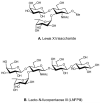The Microbiota, Immunoregulation, and Mental Health: Implications for Public Health
- PMID: 27436048
- PMCID: PMC5763918
- DOI: 10.1007/s40572-016-0100-5
The Microbiota, Immunoregulation, and Mental Health: Implications for Public Health
Abstract
The hygiene or "Old Friends" hypothesis proposes that the epidemic of inflammatory disease in modern urban societies stems at least in part from reduced exposure to microbes that normally prime mammalian immunoregulatory circuits and suppress inappropriate inflammation. Such diseases include but are not limited to allergies and asthma; we and others have proposed that the markedly reduced exposure to these Old Friends in modern urban societies may also increase vulnerability to neurodevelopmental disorders and stress-related psychiatric disorders, such as anxiety and affective disorders, where data are emerging in support of inflammation as a risk factor. Here, we review recent advances in our understanding of the potential for Old Friends, including environmental microbial inputs, to modify risk for inflammatory disease, with a focus on neurodevelopmental and psychiatric conditions. We highlight potential mechanisms, involving bacterially derived metabolites, bacterial antigens, and helminthic antigens, through which these inputs promote immunoregulation. Though findings are encouraging, significant human subjects' research is required to evaluate the potential impact of Old Friends, including environmental microbial inputs, on biological signatures and clinically meaningful mental health prevention and intervention outcomes.
Keywords: Anxiety; Depression; Lactobacilli; Microbiome; Mycobacteria; Posttraumatic stress disorder.
Figures
References
-
-
Miller AH, Raison CL. The role of inflammation in depression: from evolutionary imperative to modern treatment target. Nat Rev.Immunol. 2016;16:22–34. This study outlines current evidence for inflammation in the etiology and pathophysiology of depression, and the rationale for antiinflammatory and immunoregulatory approaches to treatment of depression.
-
-
- Fernandes BS, Steiner J, Bernstein HG, Dodd S, Pasco JA, Dean OM, Nardin P, Goncalves CA, Berk M. C-reactive protein is increased in schizophrenia but is not altered by antipsychotics: meta-analysis and implications. Mol.Psychiatry. 2016;21:554–564. - PubMed
-
- Maes M, Ombelet W, Libbrecht I I, Stevens K, Kenis G, De JR, Lin AH, Cox J, Bosmans E. Effects of pregnancy and delivery on serum concentrations of Clara Cell Protein (CC16), an endogenous anticytokine: lower serum CC16 is related to postpartum depression. Psychiatry Res. 1999;87:117–127. - PubMed
-
- Bufalino C, Hepgul N, Aguglia E, Pariante CM. The role of immune genes in the association between depression and inflammation: a review of recent clinical studies. Brain Behav.Immun. 2013;31:31–47. - PubMed
Publication types
MeSH terms
Grants and funding
LinkOut - more resources
Full Text Sources
Other Literature Sources
Medical


